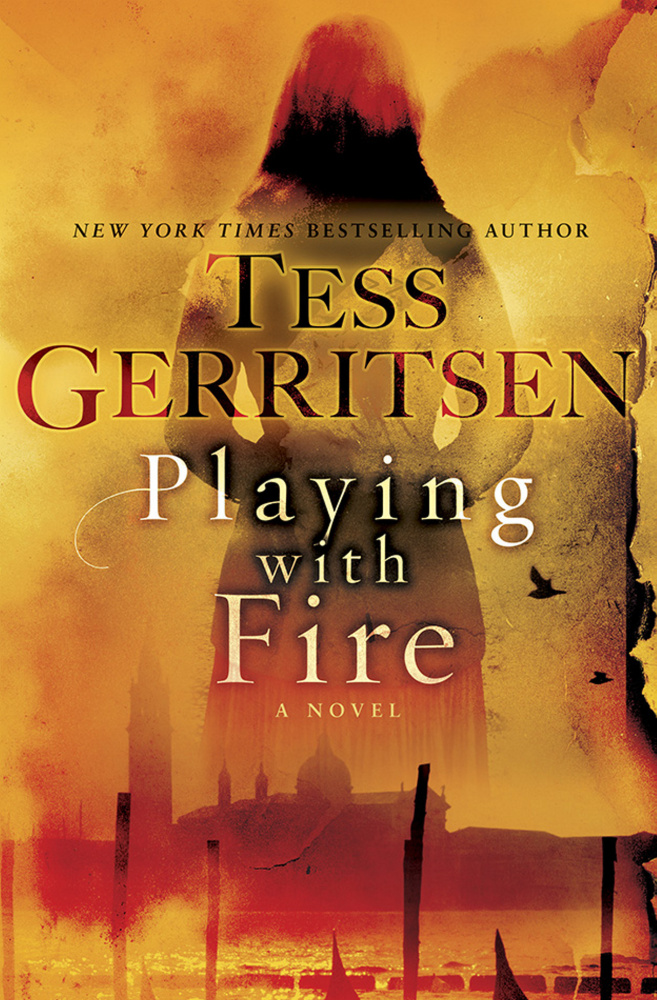A sheet of music – a haunting waltz written hurriedly on a scrap paper – ties together the two storylines in Tess Gerritsen’s new medical thriller, “Playing with Fire.” The waltz is entitled “Incendio,” an Italian word for “fire,” and comes into the hands of Julia Ansdell quite accidentally on her last day in Rome before returning home to Massachusetts to her husband and her 3-year-old daughter, Lily. The sheet flutters to the floor of a gloomy little shop as she inspects another book she wishes to purchase. Julia, a violinist, knows from reading the opening measures that it is magnificently beautiful. L. Todesco is inscribed at the bottom of the sheet.
The story of Lorenzo Todesco opens in the 1930s in the Jewish ghetto in Venice, when Lorenzo is but a boy. His grandfather gives him a beloved violin, a 200-year-old family heirloom, which he calls La Dianora – The Sorceress. His grandfather gifts it to Lorenzo, for he has recognized in his grandson the rare talent of being able to make music come alive.
The first time Julia plays the music at home in Brookline, she becomes possessed as she moves into the more challenging section of the music. Her body shudders, her hand cramps. And then she looks down – to find Lily rubbing bloody hands on her leg. Following the trail of blood out into the garden, Julia finds the family cat lifeless.
The second time she attempts to play the music, Julia is possessed again. When she looks down this time, she sees Lily stabbing a piece of broken glass into her leg.
In alternating sets of chapters, the reader follows Julia’s torment in wondering what is wrong with her daughter and the progression of Lorenzo’s story. In 1938, at age 18, Lorenzo becomes paired with a stranger, the daughter of his grandfather’s best friend, to perform a duet in Venice’s major musical competition. Laura is a cellist – and a darkly beautiful one. Over the months of practicing together, Lorenzo and Laura grow quite attracted and attached to one another without acknowledging it. Their story is set against the fascist government’s repression of Italian Jews. As the young pair is about to take the stage to perform, they are notified without explanation that they are ineligible to play. Both understand that Lorenzo being Jewish is the reason why.
Gathering strength from one another’s fierceness, they take the stage anyway and play flawlessly, clearly distinguishing themselves as the best in the evening’s program. It is a moment of great personal triumph, but serves in the end only as fodder for the brutal manifestation of anti-Semitism that is yet to come.
Before midpoint in “Playing with Fire,” Lorenzo’s story – about what happens to him and his family and the other Jews of Venice – clearly eclipses Julia’s story. This in spite of the fact that her story becomes dramatically darker as she grows more desperate to find the truth of what’s wrong with Lily. Woven into her search for an explanation is Julia’s childhood backstory that involves a mother who seemingly had a nervous breakdown and murdered her 2-year-old son, later dying herself locked away in an asylum. Julia manages to put together the fact that both times she was shocked by Lily’s behavior, she was attempting to play the Incendio.
Julia sets out to discover the origin of the music and to learn about its composer. Short of going on a quest to Venice to disinter the truth, she can find no record or reference of L. Todesco or his music anywhere.
Gerritsen, a Maine-based best-selling author, is spellbinding in her development of both storylines. Each is compelling, but each is further amplified by the early interweaving of the other.
An imbalance in the novel creeps in, however, perhaps inevitably so, given the disparate weight of the two storylines. Both are intensely personal, but Lorenzo’s is also global. The story of what happens between him and Laura, and to his family, and to Lorenzo himself is so heartbreaking that his story rises to stand in proximity with William Styron’s “Sophie’s Choice.”
In the end, the convenience and brevity with which Gerritsen resolves the tension of Julia’s story is what most grievously weakens it as a companionable storyline. That said, “Playing with Fire” is worthwhile, for the thrill of witnessing greatness coming so close to fully unfolding on the page.
Frank O Smith is a Maine writer whose novel, “Dream Singer,” was named a Notable Book of the Year in Literary Fiction in 2014 by “Shelf Unbound” and was a finalist for the Bellwether Prize, created by best-selling novelist Barbara Kingsolver “in support of a literature of social change.” Smith can be reached via his website:
frankosmithstories.com
Copy the Story LinkSend questions/comments to the editors.




Success. Please wait for the page to reload. If the page does not reload within 5 seconds, please refresh the page.
Enter your email and password to access comments.
Hi, to comment on stories you must . This profile is in addition to your subscription and website login.
Already have a commenting profile? .
Invalid username/password.
Please check your email to confirm and complete your registration.
Only subscribers are eligible to post comments. Please subscribe or login first for digital access. Here’s why.
Use the form below to reset your password. When you've submitted your account email, we will send an email with a reset code.